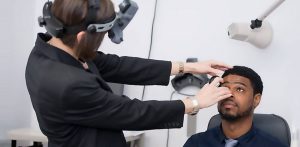Over 23% of the population experiences a concussion during their lifetime and suffer with life-long consequences.
Up to 90% of traumatic brain injury (TBI) patients develop vision problems that affect their performance of daily activities and overall quality of life for weeks, months and even years following the neurological insult.
The good news is that many vision problems that stem from a concussion or other form of TBI can be treated with neuro-optometry.
What is a concussion?
A concussion is a form of traumatic brain injury (TBI) caused by a sudden blow or jolt to the head that results in a rapid back and forth movement of the brain.
Rapid brain movement causes the neurons to stretch and become damaged, thus altering the chemical and metabolic make-up of the brain cells and affecting their ability to communicate properly.
Since the brain is the control center of the body, a concussion can have far-reaching consequences.
Common symptoms of a concussion include:
- Nausea
- Headache
- Dizziness
- Loss of focus
- Lightheadedness
- Sensitivity to light
- Attention difficulties
How does a concussion impact vision?
Since our eyes are controlled by the brain, a brain injury of any kind can severely impact the normal functioning of the visual system and result in a condition called Post Trauma Vision Syndrome (PTVS).
While in most cases, this condition does not affect eye health, it does disrupt the communication between the brain and the eyes and impact vision clarity and comfort.
Visual symptoms of PTVS include:
- Blurred vision
- Double vision
- Low blink rate
- Depth-perception issues
- Difficulty with eye-tracking
- Sensitivity to light (photophobia)
- Eyestrain, especially while reading or using the computer
Many doctors are unaware of the symptoms of PTVS or how to treat them.
Fortunately, neuro-optometric vision rehabilitation can help to reduce or even eliminate PTVS visual symptoms with specially designed activities aimed to retrain the neurological processes in the brain.
SEE RELATED: Neuro-Optometry FAQs
If you or a loved one has suffered a concussion, schedule an appointment with an eye doctor near you for a comprehensive evaluation of your vision.
What is neuroplasticity?
Neuroplasticity is the brain’s ability to adapt in response to new experiences. Research has shown that the brain continuously creates new neural connections and pathways throughout our lifetime!
Every time you learn or experience something new, your brain establishes new neural pathways to allow you to hold on to the information.
The more we review or practice the new information, the stronger these new neural pathways become.
This is a significant discovery that attests to the efficacy of neuro-optometric rehabilitation and its ability to strengthen the visual functioning of the brain.
What is neuro-optometric rehabilitation?
Neuro-optometric rehabilitation is a customized therapy program that aims to strengthen the visual skills following any type of neurological injury.
Neuro-optometric rehabilitation enables increased independence for daily activities and improved quality of life, following a concussion or other TBI.
A program of neuro-optometry may include:
1 Vision therapy
Vision therapy is a personalized program that strengthens the eye-brain connections to improve the visual skills necessary for daily living, such as depth perception, hand-eye coordination, eye tracking, focusing, and peripheral vision.
2. Prescription lenses (glasses)
Specialized lenses may be prescribed to adjust for neural damage and improve visual clarity and comfort. Special coatings applied to the lenses can also reduce light sensitivity and glare.
3. Prism lenses
Prism lenses alter the way in which light enters the eye. Prisms help to eliminate double vision, dizziness and imbalance, as well as other binocular vision problems.
4. Patching
Wearing a patch over one eye, or applying a patch directly to the surface of one eyeglass lens, can eliminate double vision by suppressing the vision of one eye.
What does neuro-optometry treat?
Neuro-optometric rehabilitation is an effective treatment for the following visual symptoms induced by a TBI:
- Visual neglect
- Visual field loss
- Loss of central vision
- Strabismus (eye turn)
- Convergence insufficiency
- Focusing and fixating difficulties
- Tracking and scanning difficulties
LEARN MORE: Guide to Neuro-Optometry Rehabilitation
If you are suffering the impact of a concussion, schedule an appointment with an eye doctor near you for a comprehensive evaluation.
Following a concussion or other brain injury, it is important to begin a customized neuro-optometric rehabilitation program as soon as possible to achieve optimal results.









